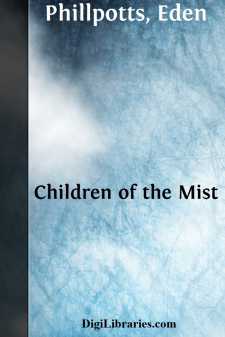Categories
- Antiques & Collectibles 13
- Architecture 36
- Art 48
- Bibles 22
- Biography & Autobiography 813
- Body, Mind & Spirit 142
- Business & Economics 28
- Children's Books 17
- Children's Fiction 14
- Computers 4
- Cooking 94
- Crafts & Hobbies 4
- Drama 346
- Education 46
- Family & Relationships 57
- Fiction 11829
- Games 19
- Gardening 17
- Health & Fitness 34
- History 1377
- House & Home 1
- Humor 147
- Juvenile Fiction 1873
- Juvenile Nonfiction 202
- Language Arts & Disciplines 88
- Law 16
- Literary Collections 686
- Literary Criticism 179
- Mathematics 13
- Medical 41
- Music 40
- Nature 179
- Non-Classifiable 1768
- Performing Arts 7
- Periodicals 1453
- Philosophy 64
- Photography 2
- Poetry 896
- Political Science 203
- Psychology 42
- Reference 154
- Religion 513
- Science 126
- Self-Help 84
- Social Science 81
- Sports & Recreation 34
- Study Aids 3
- Technology & Engineering 59
- Transportation 23
- Travel 463
- True Crime 29
Children of the Mist
by: Eden Phillpotts
Description:
Excerpt
Phoebe Lyddon frowned, and, as an instant protest, twin dimples peeped into life at the left corner of her bonny mouth. In regarding that attractive ripple the down-drawn eyebrows were forgotten until they rose again into their natural arches. A sweet, childish contour of face chimed with her expression; her full lips were bright as the bunch of ripe wood-strawberries at the breast of her cotton gown; her eyes as grey as Dartmoor mists; while, for the rest, a little round chin, a small, straight nose, and a high forehead, which Phoebe mourned and kept carefully concealed under masses of curly brown hair, were the sole features to be specially noted about her. She was a trifle below the standard of height proper to a girl of nineteen, but all compact, of soft, rounded lines, plump, fresh of colour, healthy, happy, sweet as a ripe apple.
From a position upon swelling hillsides above the valley of a river, she scanned the scene beneath, made small her eyes to focus the distance, and so pursued a survey of meadow and woodland, yet without seeing what she sought. Beneath and beyond, separated from her standpoint by grasslands and a hedge of hazel, tangled thickets of blackthorn, of bracken, and of briar sank to the valley bottom. Therein wound tinkling Teign through the gorges of Fingle to the sea; and above it, where the land climbed upward on the other side, spread the Park of Whiddou, with expanses of sweet, stone-scattered herbage, with tracts of deep fern, coverts of oak, and occasional habitations for the deer.
This spectacle, through a grey veil of fine rain, Phoebe noted at mid-afternoon of a day in early August; and, as she watched, there widened a rift under the sun’s hidden throne, and a mighty, fan-shaped pencil of brightness straggled downwards, proceeded in solemn sweep across the valley, and lighted the depths of the gorge beyond with a radiance of misty silver. The music of jackdaws welcomed this first indication of improved weather; then Phoebe’s sharp eyes beheld a phenomenon afar off through the momentary cessation of the rain. Three parts of a mile away, on a distant hillside, like the successive discharges of a dozen fowling-pieces, little blotches of smoke or mist suddenly appeared. Rapidly they followed each other, and sometimes the puffs of vapour were exploded together, sometimes separately. For a moment the girl felt puzzled; then she comprehended and laughed.
“’Tis the silly auld sheep!” she said to herself. “They ’m shakin ’theer fleeces ’cause they knaw the rain’s over-past. Bellwether did begin, I warrant, then all the rest done the same.”
Each remote member of the flock thus freed its coat from the accumulated moisture of a long rainfall; then the huddled heap, in which they had combined to withstand the weather and show tail to the western storm, began to scatter. With coughs and sneezes the beasts wandered forward again, and pursued their business of grazing.
Steadily the promises of the sky multiplied and Phoebe’s impatience increased. Her position did not, however, depend for comfort upon the return of sunshine, for she stood out of the weather, where sundry giant rocks to the number of five arose in a fantastic pile. Nature’s primal architects were responsible for the Pixies’ Parlour, and upon the awful morning of Dartmoor’s creation these enormous masses had first been hurled to their present position—outposts of the eternal granite, though themselves widely removed from the central waste of the Moor. This particular and gigantic monument of the past stands with its feet in land long cultivated. Plough and harrow yearly skirt the Pixies’ Parlour; it rises to-day above yellow corn, to-morrow amid ripening roots; it crowns the succeeding generations of man’s industry, and watches a ceaseless cycle of human toil. The rocks of which it is composed form a sort of rude chamber, sacred to fairy folk since a time before the memory of the living; briars and ivy-tods conceal a part of the fabric; a blackthorn, brushed at this season with purple fruit, rises above it; one shadowed ledge reveals the nightly roosting place of hawk or raven; and marks of steel on the stone show clearly where some great or small fragment of granite has been blasted from the parent pile for the need of man....






